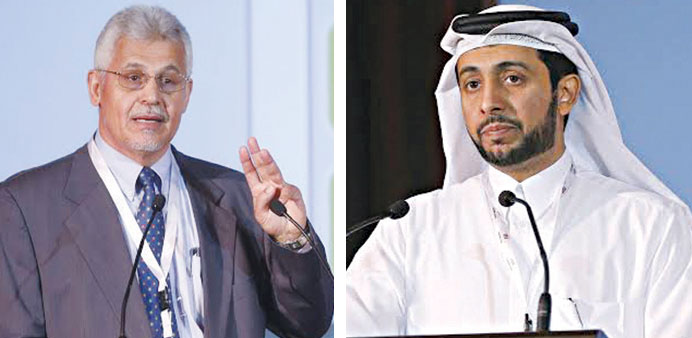|
Said Mansour explaining a point at his presentation and Qatar University Vice President (Research) Hassan al-Derham speaking at yesterday’s meeting. PICTURES: Jayaram
The Qatar Foundation Research and Development (QFRD) will have at least 500 top quality scientists working for its various research projects, including Qatar Energy and Environment Research Institute (QEERI) projects, by 2018, according to the QEERI research director. |
Speaking at a session of a regional infrastructure and transport track conference yesterday, Said Mansour said the Qatar Foundation (QF) is developing additional facilities to meet the demand for its research and related programmes.
The senior QEERI director said the institute is working towards its goal to turn Qatar into a knowledge-based economy in line with the Qatar National Vision 2030. “The institute has its focus on such ambitious projects as energy independence, water sustainability, environment conservation and self-sufficiency in food,” he said, adding that the number of scientists working for QF research projects would reach 2,000 by the end of the decade.
Currently, he said, the QEERI is working on plans to generate 1 gigawatts (1,000 megawatts) of solar energy by 2020. “Along with research on such subjects as integrating solar energy production and energy storage technologies, the institute also puts emphasis on finding cost-effective, cheaper and environment-friendly solutions to meet the country’s future energy requirements,” he added.
Mansour also explained the efforts being made by the researchers to reduce the size of the width of the solar cells, using locally developed
technologies and inexpensive sodium batteries.
“The QEERI is also working on reducing the massive costs in water desalination by about 40% from the existing levels. Efforts are also on to
improve the quality of used water,” he said.
Hassan al-Derham, vice-president, research, QU, said the university has seen a huge growth in the number of masters and doctoral programmes over the years.
“While there were only four Masters programmes five years ago, now QU offers 24 Masters programmes,” he said, adding that fund allocation for university’s research programmes has reached $270mn.

